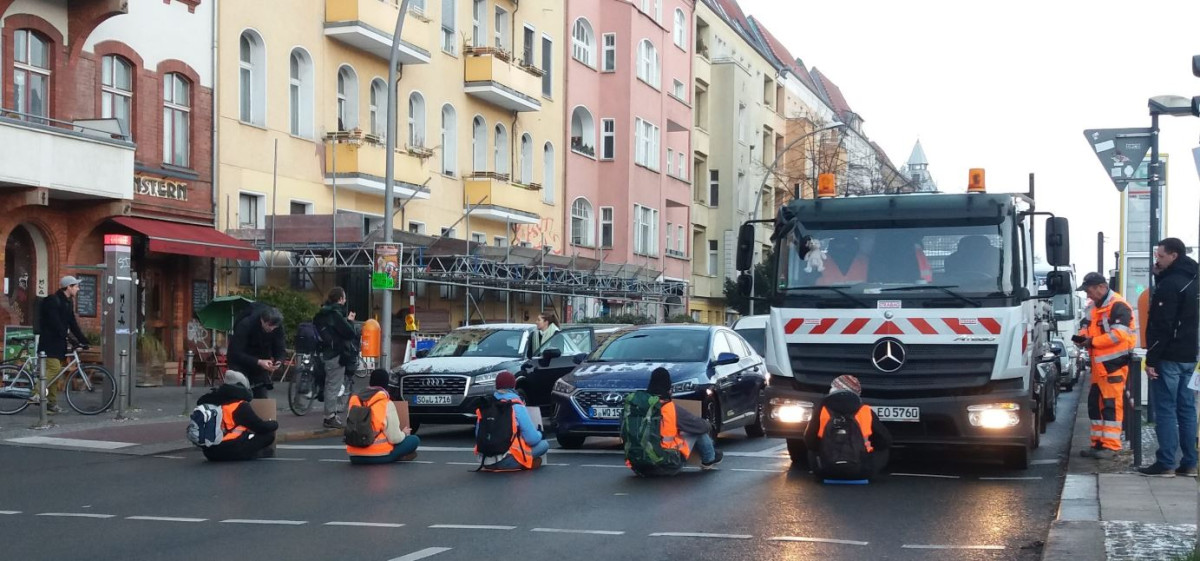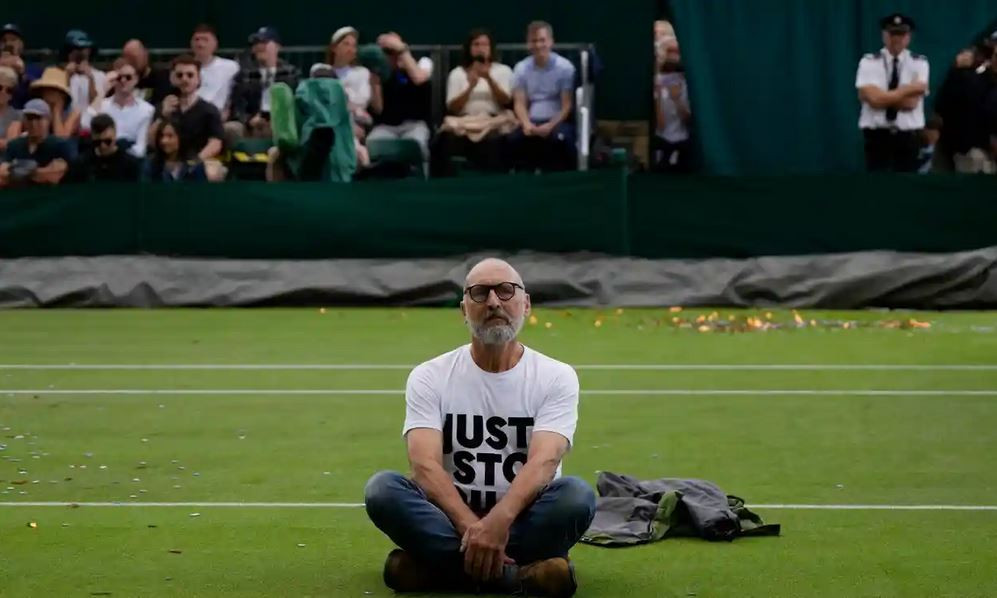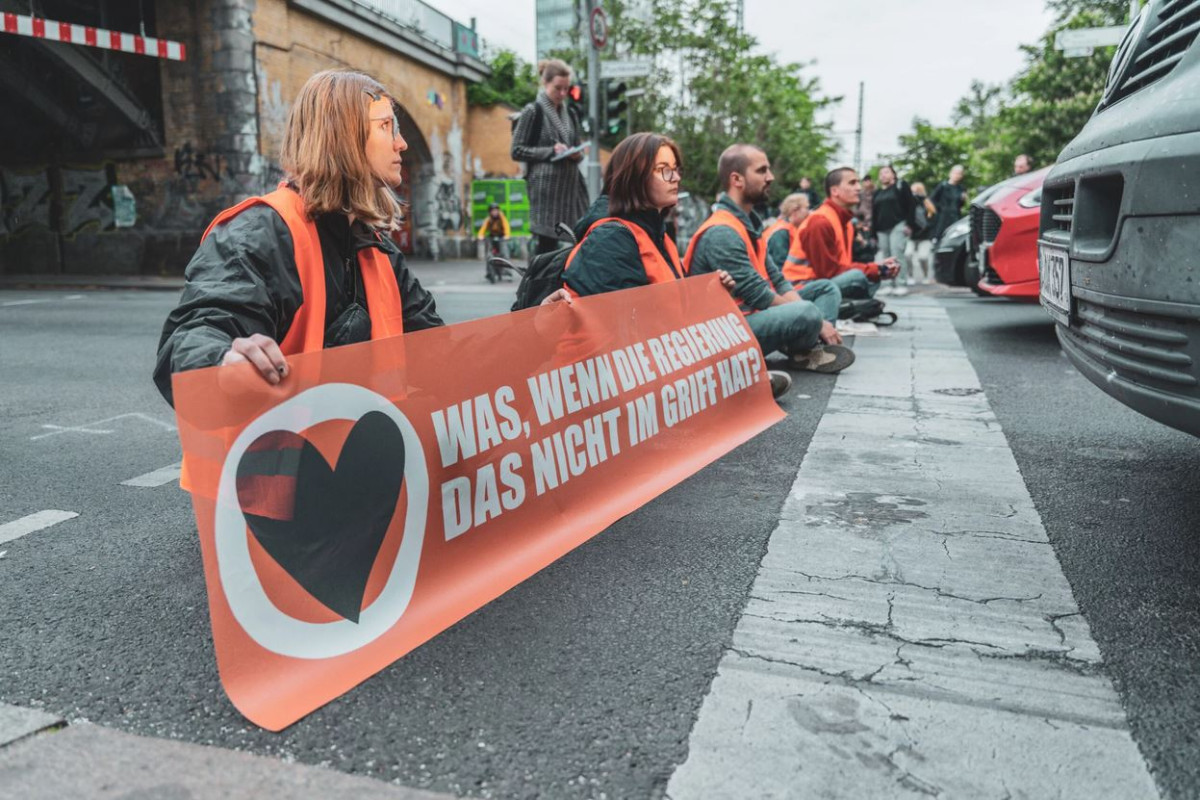Europe is cracking down on radical climate protests
Attention-grabbing climate protests have been a regular media fixture since 2019, when the Fridays for Future movement held its first global school strike and the Extinction Rebellion group staged mass public demonstrations in London. Over the last year or two however, these stunts have taken a more dramatic turn. When protestors from Just Stop Oil threw a can of tomato soup over Van Gough’s sunflowers, the images quickly went viral and sparked intense debate about the tactics all over the world. In Germany, members of the Last Generation group glued themselves to roads on a near-weekly basis for months, outraging motorists and drawing angry statements from politicians.
And just as their tactics are becoming more disruptive, the police response is also becoming harsher. In Germany in May, police raided Last Generation members under suspicion of forming a criminal organisation, using a law that was originally designed to target organised crime and terrorist groups. In France, the group Les Soulevements de la Terre was forcibly shut down by authorities, with interior minister Gerald Darmanin repeatedly referring to their actions as “eco-terrorism”. The UK has bought in a draconian anti-protest law that critics says completely undermines the public’s right to freedom of assembly. While these crackdowns show no signs of slowing down, what’s less clear is how they may affect the conversation on climate change policy – particularly in the run-up to next year’s EU elections.
Europe-wide crackdown
“[The police approach] has changed significantly from the first Extinction Rebellion protests,” says Raj Chada, a partner at London law firm Hodge Jones & Allen, who has represented multiple climate protesters in court. “It was all very jovial, they let the protests go on for weeks. Now that tolerance has disappeared completely.” As well as more protesters being taken to court, he is also seeing clients being sent to prison for the first time in his career – something that goes against the long Western European tradition of not imprisoning protesters.
Chada sees several reasons for this crackdown. Firstly, the UK government hasn’t had to face mass protests for a while, and therefore seems fearful of them. “The nature of those protests has changed, there’s no doubt about that,” he adds. “They’re becoming more disruptive. They’re organised in a different way through social media. And the range of people taking part is strikingly different – young, old, all walks of life.”
Similarly heavy-handed approaches are happening in tandem all around Europe, alarming human rights experts. Amnesty International’s Europe Regional Office has been tracking the anti-protest laws in 21 different countries around the continent. “We’re seeing proposed legislation that actively targets this type of non-violent direct action,” says senior campaigner Catrinel Motoc, giving the example of possible new laws in Italy that would make targeting landmarks and monuments a specific offence. In other cases, she says existing laws are being reinterpreted to repress protestors – just like in Germany, the Italian government has also used anti-mafia laws to target climate activists.
Motoc says that Amnesty International is concerned by these developments. “Climate protestors have become more vocal and a bit more disruptive in the last few years,” she acknowledges. “But states and authorities have an obligation to accommodate that, and an enhanced level of disruption should not bring an enhanced state response.” Following a crackdown on Germany's "Last Generation" group, the UN has also highlighted the importance of climate activists and their right to hold demonstrations, stressing that protesters have been instrumental at "crucial moments in pushing governments and business leaders to do much more" to combat climate change.
Unexpected consequences
Many policymakers push for harsh punishments in the safe knowledge that they have the backing of a large majority of voters who are sceptical of radical climate protests. Governments are also hoping that stricter laws will deter protestors from taking part in direct action. When Last Generation activists forced several German airports to halt operations at the start of the summer by protesting on the runway, the country's justice minister Marco Buschmann reacted to the tabloid front-page headline "Attack on our holidays" by warning activists they could face long prison sentences and heavy fines.
But while some people may be scared to join radical protests because they don’t want to risk a criminal record, experts also believe that in some cases this crackdown may have the opposite effect. Chada says he has noticed more people joining the climate movement in the UK out of solidarity with arrested protestors. This phenomenon can also be seen in Germany, where rallies in support of Last Generation members were organised around the country following the raids in May. Chada also believes the police repression may further radicalise some in the movement, causing them to plan even more extreme stunts.
This spiralling activity has led some who work in the space to speculate whether both the protests and crackdowns may simply reinforce the political polarisation that has become endemic around the continent in recent years. “Unfortunately, I have the feeling that [the reactions to these protests] are fuelling further polarisation between the social and climate agenda,” says Chiara Martinelli, director at CAN Europe. “In my opinion, this will be the big battle in the run-up to the EU elections. If we don’t find a way to ensure that voters are convinced that climate and social agendas go hand-in-hand, then it will be a disaster.”
She describes feeling frustration over the public and political debate being focused on “whether the protests are good or bad. I wish we could focus on the reasons why people are angry.”
Climate policy has already become one of the most polarising topics in several European countries. On migration and combating climate change, people showed the greatest hostility towards those with opinions differing from their own in an international survey, which also found that people on the political left are more polarised than those on the right.
Impact on public opinion
However, others are not convinced that either the intensity of the protests, or the increasing criminalisation of them, will have an impact on how members of the public actually feel about climate policy. Daniel Saldivia Gonzatti, a post-doctoral research fellow at WZB Berlin Social Science Center, recently conducted a study measuring both participants’ views on climate protests and on climate legislation more broadly.
“We found that people have quite a negative view of climate protests,” he said. “They have less support for them, less sympathy, and see them as less legitimate than traditional demonstrations.” However, his research found this had no bearing whatsoever on people’s views on climate policy. “Politicians have argued that these protests damage the cause,” he said. “But we found that although people dislike [the protests], they have no effect on what degree they think climate change policy is important.”
In Germany, support for the climate movement has halved following the rise of street blockades by more radical activists, according to a survey by More in Common Germany, an initiative that researches social cohesion. “All parts of society are much more critical of the climate movement today than they were two years ago – it has not gained or maintained ground with anyone,” says the organisation. While many people see a need for strong actions by the climate movement, the share of respondents who say that protests go too far grew substantially.
More in Common warned that a divisive debate can slow climate protection if it is pitting people against each other along cultural divides, and calls for a unifying debate. Some people partly blame radical activists for the rise of the far-right Alternative für Deutschland (AfD) in polls. The more moderate Fridays for Future movement has also repeatedly accused the Last Generation activists of dividing society: "The climate crisis needs solutions for society as a whole, and we can only find and fight for them together, not by turning people against each other in everyday life."
Making mainstream climate policies more palatable?
As to what the impact on public opinion may be in the longer term, some academics have identified what they term the “radical flank effect” of social change movements. “When the efforts of the movement are frustrated, radical segments emerge and deploy more disruptive tactics,” Heather Alberro, lecturer in global sustainable development at Nottingham Trent University, writes in The Conversation. “These serve to render the demands of their mainstream counterparts more palatable in the eyes of governments and the public, effectively advancing the entire movement’s agenda.”
WZB Berlin’s Social Science Center’s Gonzatti believes this may already be happening in the climate protest space. “Look at Fridays for Future – they are now viewed as the moderate environmental movement,” he says. However, he also points out that it is difficult to closely study long-term effects on public opinion as it is so hard to disentangle other influencing factors.
Even if it is tricky to state for certain how public views on climate may be impacted by protestors in the coming years, many researchers believe the effect on those joining in the demonstrations themselves is clear: taking part in protests appears to solidify eco-conscious behaviours. People appear more likely to adapt their behaviours when they see themselves as part of a group, and protesting delivers this sense of belonging
There is little sign that the police crackdown on protestors will ease up in the near future – if anything, it looks on track to intensify. But climate protesters themselves don’t appear to be giving up the fight. “The government thinks [oppression] will stop protests, but I’m not sure it will,” says Chada the lawyer. “I think it will lead to more people in prison. But I don’t think it will stop the protests themselves.”





